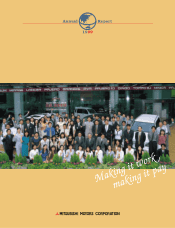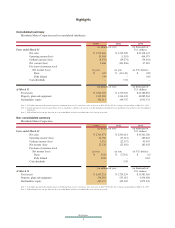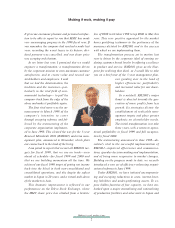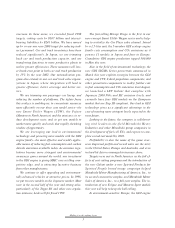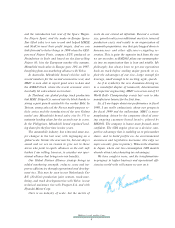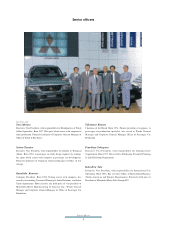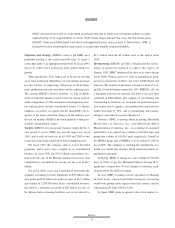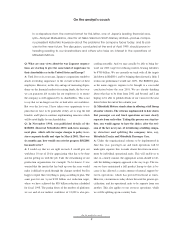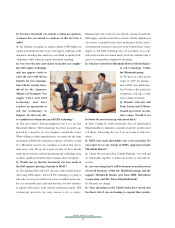Mitsubishi 1999 Annual Report Download - page 11
Download and view the complete annual report
Please find page 11 of the 1999 Mitsubishi annual report below. You can navigate through the pages in the report by either clicking on the pages listed below, or by using the keyword search tool below to find specific information within the annual report.
On the analyst's couch
9
Q: You have drastically cut and put a ceiling on capital in-
vestment. Do you intend to continue at this level for a
while?
A: I'm looking at keeping an annual ceiling of ¥80 billion on
capital investment for three years. Our biggest challenge at the
moment is deciding how much we can afford to spend on de-
velopment, while reducing capital investment spending.
Q: You were the first auto maker to market cars employ-
ing GDI engine technology
and you appear ready to
catch the wave with the tax
benefits for low-consump-
tion vehicles recently intro-
duced by the Japanese
Ministry of Transport. You
supply Volvo with GDI
technology and have
reached an agreement to
sell the technology to
Peugeot. Are there any oth-
er candidates to whom you can sell GDI technology?
A: This may sound a little presumptuous, but it is a fact that
Mitsubishi Motors' GDI technology has been favorably ap-
praised by a majority of auto engineers around the world.
When talking to other manufacturers, we point out the huge
investment in R&D the technology requires, and that it would
be a Herculean task for any company to recover that invest-
ment on its own. We go on to point out that we have already
made the investment, and that purchasing the technology from
us offers significant benefits from a balance sheet viewpoint.
Q: Would you say that the investment you have made in
the GDI engine is proving a burden to MMC?
A: The playing field will level out once other manufacturers
start using GDI engines. Fuel-cell EV technology is going to
take take several years before it becomes available on the mar-
ket at a reasonable price and until that day, our best option is
to improve efficiencies in the internal combustion engine. GDI
technology provides the only means to do so today.
Manufacturers the world over are already moving towards the
GDI engine, and this trend will accelerate with the depletion of
oil reserves, as market factors drive up the price of fuel, and as
environmental awareness increases in the United States. Some
might say that GDI technology has yet to produce an accept-
able return on the investment made, but I am confident that it
gives us a tremendous competitive advantage.
Q: You have stated that Mitsubishi Motors will develop fu-
el cell technology within
the Mitsubishi group.
A: We have set a provisional
target of 2005 for putting a
fuel cell EV into production,
but I believe this particular
technology will take a long
time to bring to fruition.
Q: Daimler Chrysler and
Ford, Toyota and GM have
teamed up to form two dis-
tinct camps. Would it not
be better for you to team up with one of these?
A: Now, I might be a little biased here, but as I understand it
Mitsubishi Heavy Industries currently leads the world in fuel
cell theory. This being the case, I see no reason to look else-
where.
Q: MHI, your main shareholder, has a new president. Do
you expect to see any change in MHI's approach towards
Mitsubishi Motors?
A: I know the new president, Takashi Nishioka, very well and
we talk frankly together, so I have no worries at all in that di-
rection.
Q: Are you saying that it will be business as usual in terms
of overall harmony within the Mitsubishi group, and the
support Mitsubishi Motors gets from MHI, Mitsubishi
Corporation, and The Tokyo Mitsubishi Bank?
A: Precisely; no change.
Q: Your operations in the United States have moved into
the black, but if you are looking to expand those profits,

